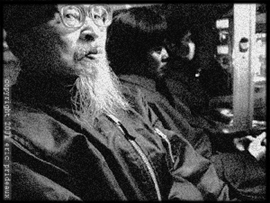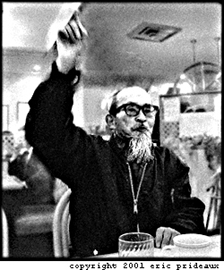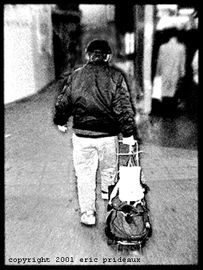Mr. Maruyama and His Pigeons
The Interview Series
Sometimes the newsroom can be an ever so cold place to pass one's days. Usually though it has more to do with junior reporter Junko's demeanor rather than any thermometer reading. But on a recent morning, things were a bit different. Even in consideration of witches' tits and elbows, my office was colder than any part of a female heathen's anatomy, the exception  being the lips of my ex-wife.
being the lips of my ex-wife.
"Who didn't pay the heating bill this month?" I barked into the newsroom. "Or did someone yank all the insulation out of the walls over the weekend?"
She immediately arrived in my doorway rifling through a stack of papers. Answers to my queries usually take time. Junko's expedience smelled of a sneaky and devious plot - she wanted me to do something. I reached into my desk drawer for my pack, waiting for the other shoe, or perhaps icicle, to fall.
A bit distracted by the papers, she asked, "What's insulation?" That wasn't the icicle. So I lit a cigarette and thought of a logical reason as to why the Pink Panther's best friend has yet to be included in the Japanese building code.
"But you'll be plenty warm at Denny's," she added. That was the icicle.
At that moment though my thoughts had been taken to another place - a dock in Yokohama Bay. There, crates of some of Owens Corning's finest were residing (mislabeled "overstocked Hello Kitty sleeping bags"), waiting for their chance to be introduced to Japan and begin supplying warmth to the nation's homes and offices. As the years roll by, longshoremen relax beside, drinking canned coffee, smoking cigarettes, laughing, periodically reaching back to peal a fresh comic book from a stack resting on a crate of thermostats.
I shook my head when I had drifted from mere contemplation to pure fantasy - a ship steaming across the Pacific with a cargo of window caulking - and issued the standard reply when someone mentions Denny's, "What are you talking about?" I pushed my empty coffee cup to the side and dropped a few ashes into my tray.
"The Boss wants you to interview a potential political candidate. He figures that with this KSD scandal he is missing out on all kinds of favorable treatment in the Diet, like potential media subsidies. The problem is that he doesn't have anyone on the inside. That's why he needs to push somebody into office."
"What's the KSD scandal?" I asked, taking a puff.
"If you ever picked up a newspaper that didn't include a racing sheet, you'd know about the biggest scandal to hit Japanese politics since the Lockheed incident in the '70s." She tossed a few copies of the Yomiuri Shimbun on my desk and left in a huff.
Koyama to face probe concerning KSD bribes
The special investigation squad of the Tokyo District Public Prosecutors Office on Sunday asked House of Councillors member Takao Koyama to appear for questioning on suspicion of receiving money in exchange for raising in the Diet questions favorable to KSD, a foundation for owners of small and medium-sized companies...
"So where do I meet this potential candidate?" I called back into the newsroom.
 "With the pigeons in Shimbashi. From there you'll go to Denny's," she said.
"With the pigeons in Shimbashi. From there you'll go to Denny's," she said.
"Yeah? Well why not his office?" I stubbed out my smoke and grabbed my coat.
"He doesn't have one. He also says he has too many enemies to have the meeting at his home."
I indeed found Mr. Maruyama at the square outside the station with the pigeons. Shimbashi is his place of work. The reason being that this part of the city (the political and business center) is where the "thinkers" are. He seeks these types because his task is more akin to a mission - teaching the people his message - than a job. A rather complicated one it is too.
From his theory that the Japanese language came from Arabic (explained in his book Nihongo Kigen) to his belief that we are now living with beings from other dimensions, Maruyama slowly, patiently, and sometimes adamantly (a raised voice to match a raised hand), distilled the basis of his message over four cups of coffee after arriving at Denny's in Shibuya via bus (his idea).
But should a layman, such as myself, not understand how doctors, nurses, and policemen will be rendered redundant this century, I need simply refer to his, as he calls it, "printed material" that he dispenses to potential followers from his cart each weekday morning and evening. In addition to clarification on these subjects, his personal profile, political recommendations (the need for the breakup of the government into separate states by region), and various magazine and newspaper articles that have featured the man with a proclivity for two sugar sticks in each cup of coffee are also provided.
His weekday routine, in addition to the aforementioned-flyer distribution, also consists of reading both the morning and evening editions of Tokyo's four largest papers, eating lunch at his favorite coffee shop, and feeding the pigeons torn bits of bread purchased from the convenience store ("If humans eat it, so can pigeons," he says).
While sitting across from him as he carefully relayed his thoughts, I noticed that his appearance and mannerisms are what might be expected of a seventy-nine year old: a rather small, thin frame covered by a heavily worn jacket, a gray spaghetti length goatee, heavy glasses, a phlegm-induced cough, and a continual need to dip disposable plastic cream cups in his coffee as though they were ladles. But the broad scope of his previous deeds, listed in his profile, makes his past a little tougher to pigeonhole. Namely, he has been a translator for the U.S. occupation forces after WWII, a student of Arabic in the Middle East (mainly due to his fascination with power sources, specifically the sun and oil), an Arabic instructor (also one of the co-founders) at the Arabic Language School in Daikanyama, and a writer for the Yomiuri Shimbun in the '70s (fired for "telling the truth").
 Maruyama is most interesting when he is most passionate. No subjects provoke him more than his belief in Christ and his deep concern about the war that the unseen world and nature are presently waging against mankind.
Maruyama is most interesting when he is most passionate. No subjects provoke him more than his belief in Christ and his deep concern about the war that the unseen world and nature are presently waging against mankind.
Q: What evidence do you have of this war?
A: Recently, the unseen world has been responsible for a number of natural disasters. In Japan, there was the Great Kanto Earthquake in 1995. Last year, there was the eruption of Mt. Miyakejima. Also there was the earthquake in India this year.
Q: But natural disasters have been happening since the beginning of time, why do you think there is a war now?
A: Man has deviated from God's plan from 10 billion years ago. Most recently, we ruined the stars in space by using nuclear power. We also are polluting the environment. These things have accelerated the war and spoiled our souls. We are just living on the road God built. He lets us know how to change our behavior so that we will not lose our soul and bodies. It is up to us.
Q: How does nature plot its battles?
A: The unseen world has developed a headquarters. From there it makes calculations to line up the assaults nature lays on mankind.
Q: So how do we end this war?
A: We as humans must seek a better path. We must change our behavior. We must protect the environment and limit boundless consumerism.
Q: How many other people are spreading the word like you?
A: Well, not many people are willing to put their whole life into this like me. There are also a couple of women with superpowers out there working also. But most men are too concerned with working and making a living. Recently though, now that the status quo is crumbling with the recent political scandals, more people are coming to me.
Q: When did you become involved?
A: There was a meeting in 1985 with 50 people attending. This was the start of the recent movement. At this time I learned about how bad souls are arrested and prevented from escaping from the earth. Our goal was to remove all bad souls by 1999. We are still working at it today.
Q: Any thoughts on what we can do here in Japan while the war continues?
A: Japan is relatively safe, but you still must shine your soul. Feeding pigeons will help you to escape attacks from the bad spirits. Because when you feed them, the sparrows come and soon after the crows come. They know that the God of the Pigeons gives good ideas.
I'll certainly then be getting a loaf of bread and heading to Shimbashi before I fill out my card for the February Stakes.
Back in the newsroom I was seated at my desk later that evening when Junko entered my office. The environment had changed little since that morning.
"So how did it go?" she asked, again standing in my doorway.
 "Well he has a lot of interesting ideas," I said, leaning back in my chair and blowing into my hands. "But..."
"Well he has a lot of interesting ideas," I said, leaning back in my chair and blowing into my hands. "But..."
"He's crazy isn't he? I knew it from the phone call when he asked if you'd bring some bread and..."
"No, no, not crazy in the least. His feet are planted on terra firma as well as the average Japanese politician. But he's a little busy with this mission of his and the closest he's come to taking a bribe is a $10 fee he collected for talking about Gadhafi with a Japanese publisher during his days in the Middle East."
"Ok, well then I'll pass this along to the Boss," she said.
"Yeah well, but on the plus side," I added, "you were right about Denny's being warm. It was their Mexican rice dish set with a cup of coffee though that did the trick." As I reached for my empty cup, she turned and bolted like a deer having just heard a twig crack beneath a boot heel.
I spun my chair around and stared out the window. While souls fight for deliverance in an unseen world, my war for the delivery of a cup of coffee rages on for all to see.

